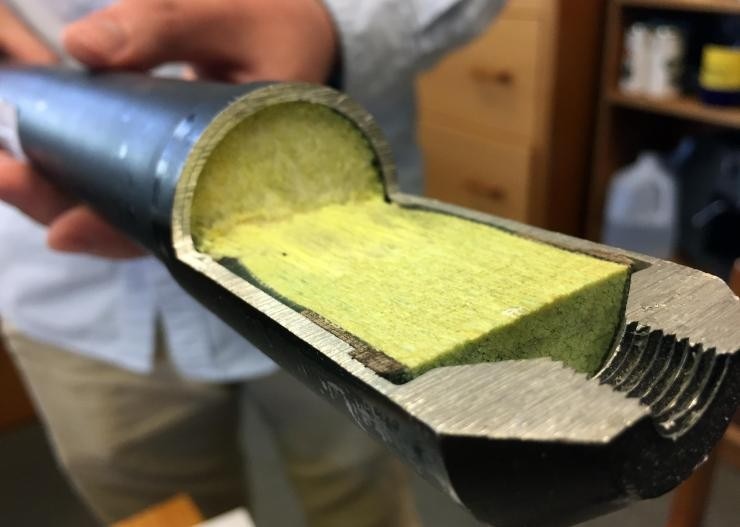Jan 27 2017
 This hollow fiber module allows compression of a large surface volume, facilitating scalability. (Credit: John Toon, Georgia Tech)
This hollow fiber module allows compression of a large surface volume, facilitating scalability. (Credit: John Toon, Georgia Tech)
Chemical separation processes make up nearly 15% of the total global energy consumption. Among the drivers for more efficient, mass separation processes that could greatly decrease that number is the development of advanced molecularly-selective synthetic membranes.
In a paper published in the Nature Materials journal this week, researchers from the Georgia Institute of Technology listed the opportunities they foresee for scalable membrane materials founded on rigid, engineered pore structures. They state that the most promising materials are scalable for utilization in compact modules and make use of entropy at the molecular level to control the separation selectivity of membranes.
It’s all about energy and carbon dioxide. Chemical separations now consume half as much energy as the entire transportation sector – land, sea and air. Our goal is to assist industry to cut that by a factor of ten, which also means cutting the CO2 emissions. That’s not going to happen right away, but we have shown that the fundamentals of this technology work.
William Koros, Professor and Roberto C. Goizueta Chair in the Chemical and Biomolecular Engineering, Georgia Institute of Technology
A membrane is an engineered barrier that manages the sorting of components by selectively allowing molecules of a specific size to pass between the inward bound feed stream and an outward bound permeate stream. As they do not need large inputs of energy – which typically would be provided from combustion of fuels – use of these membranes can greatly decrease both energy consumed and CO2 produced.
The membranes are created from hybrid materials, advanced polymers, and molecular sieves, with pore sizes customized for the intended use.
The success of aqueous membranes used to produce purified water shows the potential for decreasing energy consumption. Spiral-wound module membranes greatly minimized the cost of producing clean water, although large size differences between water molecules and contaminants made those methods technically easier than liquid and gas organics separations.
Koros’ lab specifically studies gas separations, but the paper also addresses liquid separation methods. For both the applications, he and co-author Chen Zhang indicate that to be practical, new materials have to be scalable – able to be packed closely to provide large quantities of surface area within small modules.
That is best performed using hollow-fiber membranes created using advanced versions of processes that were initially developed to produce regular textile fibers.
You’ve got to have something that is both high performance and able to be processed on the scale of acres per day. Scalability is every bit as important as the capability to do the separation. Exciting materials that are the size of a postage stamp won’t make a contribution.
William Koros, Professor and Roberto C. Goizueta Chair in the Chemical and Biomolecular Engineering, Georgia Institute of Technology
Koros is also a Georgia Research Alliance eminent scholar in membrane technology.
The two authors also argue for entropic separation methods that are enabled by restricting the capacity of molecules to diffuse via pores, according to their molecular geometry. A molecule whose geometry makes it complex to diffuse through a narrow opening may be put away, while a molecule of about the same size but diverse geometry may diffuse through.
“You may ultimately be able to get the first molecule to go through, but it pays a price in entropy,” said Koros. “If a molecule has many options for passing through the membrane, it is actually in a lower energy state. When you reduce the number of options, you are raising the free energy.”
Research activities at the Koros lab have been supported for over 20 years by the U.S. Department of Energy’s Office of Energy Science. Koros is also involved in research projects with key chemical companies and energy producers, as well as the Georgia Research Alliance.
In their research paper, Koros and Zhang, a research engineer in the School of Chemical and Biomolecular Engineering, identified five materials technologies with the potential to enhance gas separation processes, including CMS materials, flexible polymers, molecular sieves, hybrid materials, and semi-rigid polymers.
Liquid separation processes also have great opportunities for development based on new materials being created. These processes include pervaporation, organic solvent nanofiltration (OSN), osmotically moderated aqueous separation, and organic solvent reverse osmosis (OSRO).
The Nature Materials article focused on the progress that had been made in the technology and future prospects, with emphasis on recent advances in Koros lab at Georgia Tech. The goal was to promote development of new materials and alert membrane scientists about the most promising paths.
We want everybody to see this next-generation of materials and understand the processes that help attain the goals of reducing energy consumption and carbon dioxide production.
William Koros, Professor and Roberto C. Goizueta Chair in the Chemical and Biomolecular Engineering, Georgia Institute of Technology
This study was supported by the Office of Energy Science of the U.S. Department of Energy.